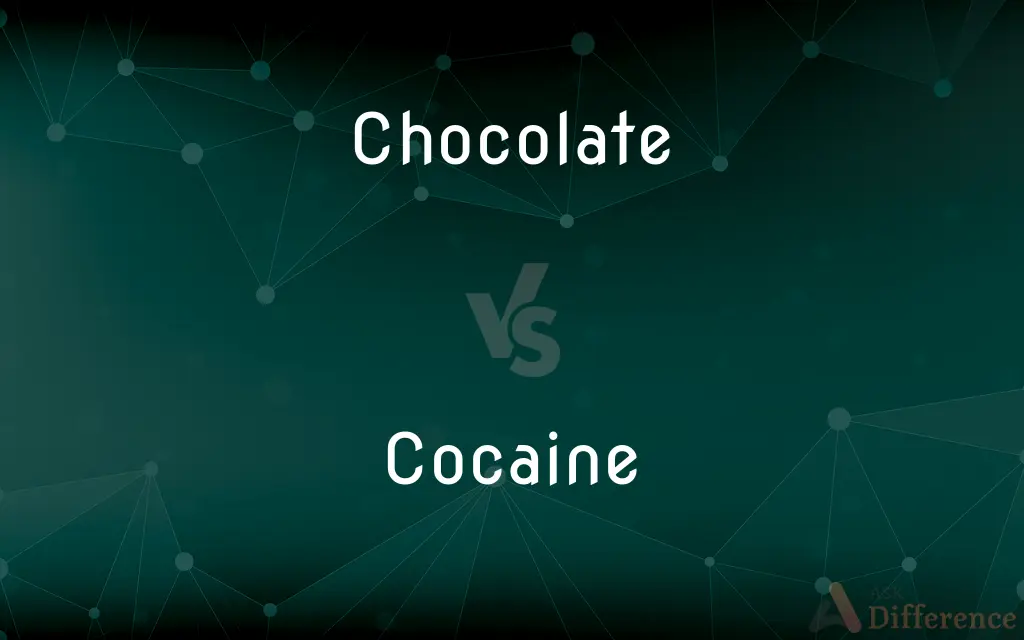Chocolate vs. Cocaine — What's the Difference?
By Maham Liaqat & Urooj Arif — Updated on March 18, 2024
Chocolate delights the senses with its rich flavor and mood-boosting properties, whereas cocaine is a potent stimulant drug with high addiction potential.

Difference Between Chocolate and Cocaine
Table of Contents
ADVERTISEMENT
Key Differences
Chocolate, derived from cocoa beans, is celebrated for its rich taste and comforting qualities, often associated with pleasure and indulgence. It contains compounds like theobromine and small amounts of caffeine, which can enhance mood and provide a mild stimulant effect. On the other hand, cocaine is a powerful and illegal stimulant that directly affects the central nervous system, leading to short-term euphoria, energy, and heightened alertness, but carries a high risk of addiction and adverse health effects.
While chocolate is enjoyed worldwide as a treat and has some health benefits when consumed in moderation, especially dark chocolate which is high in antioxidants, cocaine is a substance of abuse with no health benefits and significant risks, including dependency, cardiovascular issues, and severe mental health problems. The mood-enhancing effects of chocolate are mild and primarily due to its taste and the release of endorphins, whereas cocaine's effects are intense, resulting from its direct and potent stimulation of the brain's reward pathways.
In terms of consumption, chocolate is available in various forms such as bars, powders, and drinks, making it a versatile ingredient in both sweet and savory dishes. Cocaine, however, is most commonly snorted, smoked, or injected, and its illegal status makes its use and distribution a criminal offense in many countries. The social and legal implications of using cocaine are profound, leading to potential legal consequences, social stigma, and health crises, unlike chocolate, which is a widely accepted and legally available product.
The addictive potential of chocolate and cocaine also varies greatly. While some people may experience a craving for chocolate due to its pleasurable taste and the comfort it provides, this is incomparable to the intense and dangerous addiction that can develop from cocaine use, which can quickly lead to physical and psychological dependence requiring professional treatment to overcome.
The cultural significance of chocolate spans centuries, with a rich history that includes its use as a currency, a ritual drink, and a luxury good, reflecting its deep integration into human culture. Cocaine, although it has historical uses in traditional contexts, is predominantly seen in modern times as a substance of abuse, with its production and distribution often linked to violent drug trafficking networks, further distinguishing its negative societal impact from the generally positive perception of chocolate.
ADVERTISEMENT
Comparison Chart
Origin
Made from cocoa beans.
Extracted from coca leaves.
Effects
Mood-boosting, contains theobromine and caffeine.
Intense stimulation, euphoria, highly addictive.
Health Impact
Antioxidant properties, beneficial in moderation.
High risk of addiction, severe physical/mental health risks.
Usage
Consumed as food or drink.
Snorted, smoked, or injected as a drug.
Social and Legal
Widely accepted and legal.
Illegal, associated with drug abuse and crime.
Cultural Significance
Long history as a luxury item and treat.
Historical uses, but now mainly seen as a substance of abuse.
Compare with Definitions
Chocolate
A sweet treat made from roasted and ground cacao seeds.
She savored a piece of dark chocolate after dinner.
Cocaine
A powerful illegal stimulant drug.
Cocaine use can lead to severe health issues.
Chocolate
Versatile in culinary uses, from desserts to savory dishes.
The chef used chocolate in the mole sauce for complexity.
Cocaine
Extracted from the leaves of the coca plant.
Cocaine is processed from coca leaves grown in South America.
Chocolate
A significant part of celebrations and holidays.
They exchanged chocolates on Valentine's Day.
Cocaine
Known for its high potential for addiction.
Cocaine addiction can develop even after a short period of use.
Chocolate
A comforting and mood-enhancing food.
He had some chocolate to lift his spirits.
Cocaine
Associated with serious health risks, including heart attack and stroke.
Long-term cocaine use can damage the heart.
Chocolate
A source of antioxidants when in the form of dark chocolate.
She included dark chocolate in her diet for its health benefits.
Cocaine
Often implicated in drug trafficking and crime.
The crackdown targeted networks involved in cocaine trafficking.
Chocolate
Chocolate is a food product made from roasted and ground cacao pods, that is available as a liquid, solid or paste, on its own or as a flavoring agent in other foods. Cacao has been consumed in some form since at least the Olmec civilization (19th-11th century BCE), and the majority of Mesoamerican people - including the Maya and Aztecs - made chocolate beverages.The seeds of the cacao tree have an intense bitter taste and must be fermented to develop the flavor.
Cocaine
Cocaine (from French: cocaine, from Spanish: coca, ultimately from Quechua: kúka) is a tropane alkaloid and stimulant drug obtained primarily from the leaves of two coca species, Erythroxylum coca and Erythroxylum novogranatense. It is most commonly used as a recreational drug and euphoriant.
Chocolate
Fermented, roasted, shelled, and ground cacao seeds, often combined with a sweetener or flavoring agent.
Cocaine
An addictive drug derived from coca or prepared synthetically, used as an illegal stimulant and sometimes medicinally as a local anaesthetic.
Chocolate
A beverage made by mixing water or milk with chocolate.
Cocaine
A colorless or white crystalline alkaloid, C17H21NO4, extracted from coca leaves, sometimes used in medicine as a local anesthetic especially for the eyes, nose, or throat and widely used as an illicit drug for its euphoric and stimulating effects.
Chocolate
A small, chocolate-covered candy with a hard or soft center.
Cocaine
An addictive drug derived from coca (Erythroxylum) or prepared synthetically, used sometimes medicinally as a local anesthetic and, often illegally, as a stimulant.
Chocolate
A grayish to deep reddish brown to deep grayish brown.
Cocaine
(countable) Any derivative of cocaine.
Chocolate
Made or flavored with chocolate
Chocolate pudding.
Cocaine
A powerful narcotic alkaloid, C17H21NO4, obtained from the leaves of coca. It is a bitter, white, crystalline substance, and is remarkable for producing local insensibility to pain. It is classified as addictive and is not available in the U. S. without a prescription, but is nevertheless one of the most widespread illegal drugs of abuse. It is used in several forms, including small pellets of free base, called crack. Most of the cacaine illegally used in the U.S. is imported.
Chocolate
Of a grayish to deep reddish brown to deep grayish brown.
Cocaine
A narcotic (alkaloid) extracted from coca leaves; used as a surface anesthetic or taken for pleasure; can become powerfully addictive
Chocolate
A food made from ground roasted cocoa beans.
Chocolate is a very popular treat.
Chocolate
A drink made by dissolving this food in boiling milk or water.
Chocolate
(countable) A single, small piece of confectionery made from chocolate.
He bought her some chocolates as a gift. She ate one chocolate and threw the rest away.
Chocolate
(uncountable) A dark, reddish-brown colour/color, like that of chocolate (also called chocolate brown).
As he cooked it the whole thing turned a rich, deep chocolate.
Chocolate
A black person; (uncountable) blackness.
Chocolate
Made of or containing chocolate.
Chocolate
Having a dark reddish-brown colour/color.
Chocolate
(slang) Black relating to any of various ethnic groups having dark pigmentation of the skin.
Chocolate
To add chocolate to; to cover (food) in chocolate.
Chocolate
A paste or cake composed of the roasted seeds of the Theobroma Cacao ground and mixed with other ingredients, usually sugar, and cinnamon or vanilla.
Chocolate
The beverage made by dissolving a portion of the paste or cake in boiling water or milk.
Chocolate
A beverage made from cocoa powder and milk and sugar; usually drunk hot
Chocolate
A food made from roasted ground cacao beans
Chocolate
A medium to dark brown color
Common Curiosities
What makes cocaine a dangerous drug?
Cocaine is dangerous due to its high addiction potential and severe health risks, including cardiovascular and neurological damage.
What are the legal implications of using cocaine?
Using cocaine can lead to legal consequences, including arrest, due to its illegal status.
How is chocolate consumed?
Chocolate can be eaten as bars, used in baking, or made into drinks, among other uses.
Can eating chocolate have health benefits?
Yes, dark chocolate can have health benefits due to its high antioxidant content, when consumed in moderation.
What are the long-term health impacts of cocaine use?
Long-term cocaine use can lead to severe physical and mental health issues, including addiction, heart problems, and cognitive impairments.
What is the social impact of cocaine?
Cocaine has a negative social impact, including its association with crime, violence, and social disintegration.
Why is chocolate considered pleasurable?
Chocolate is pleasurable due to its rich flavor and mood-enhancing compounds like theobromine.
What are the short-term effects of cocaine?
Short-term effects of cocaine include euphoria, increased energy, and heightened alertness.
How is chocolate made?
Chocolate is made from fermented, dried, and roasted cacao beans that are then ground into a paste.
How is cocaine produced?
Cocaine is produced by extracting and processing the alkaloid from the leaves of the coca plant, often involving harmful chemicals.
Can cocaine use affect mental health?
Yes, cocaine use can lead to serious mental health problems, including anxiety, paranoia, and depression.
Is chocolate a part of any cultural traditions?
Yes, chocolate has a rich cultural history, including its use in ancient Mesoamerican rituals and as a luxury item in Europe.
How does cocaine affect the brain?
Cocaine affects the brain by increasing levels of dopamine, leading to its intense euphoric effects.
Is it possible to become addicted to chocolate?
While people can crave chocolate, it does not cause addiction in the same intense and dangerous manner as cocaine.
Are there different types of chocolate?
Yes, there are various types of chocolate, including dark, milk, and white, differing in cocoa content and flavor.
Share Your Discovery

Previous Comparison
Long vs. Lengthy
Next Comparison
Profile vs. PortfolioAuthor Spotlight
Written by
Maham LiaqatCo-written by
Urooj ArifUrooj is a skilled content writer at Ask Difference, known for her exceptional ability to simplify complex topics into engaging and informative content. With a passion for research and a flair for clear, concise writing, she consistently delivers articles that resonate with our diverse audience.
















































